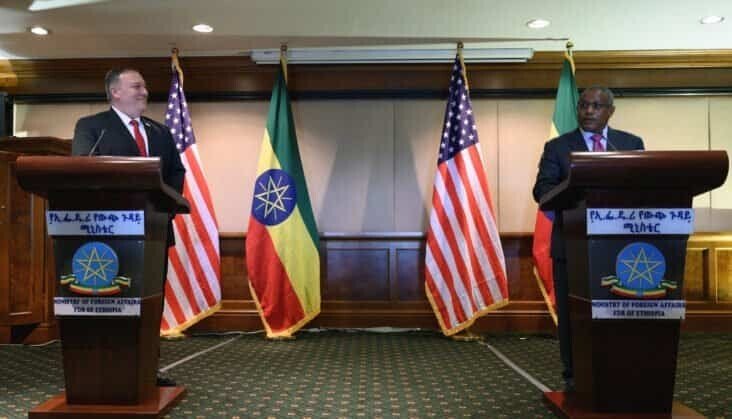
By Morris Kiruga
A decision by the United States to suspend a portion of its aid to Ethiopia over issues related to its Grand Renaissance Dam (GERD) may further complicate talks scheduled to resume in mid-September.
The announcement US President Trump’s administration on 1 September that it would halt $130m in aid to Ethiopia came days after US Secretary of State Mike Pompeo visited Sudan on the first direct Tel Aviv – Khartoum flight.
Although Ethiopia’s Prime Minister Abiy Ahmed arrived in Sudan’s capital shortly after Pompeo, it was unclear whether the two met.
US in Sudan
Pompeo was making the visit to Sudan as part of his five-day tour to push for closer relations between Arab countries and Israel, following the United Arab Emirate’s decision to normalise diplomatic ties with Jerusalem.
- The GERD issue inevitably came up in his meeting with Prime Minister Abdallah Hamdok, whose administration has been pushing to be removed from a US state sponsors of terror list.
- According to US State Department Spokesperson Morgan Ortagus, Pompeo and Hamdok “agreed that achieving [a] mutually beneficial agreement among Sudan, Ethiopia, and Egypt on the filling of the Grand Ethiopian Renaissance Dam (GERD) is crucial to regional stability.”
Behind US decision to halt aid
In a separate statement, the US State Department said that the decision to halt some of its aid to Ethiopia was informed by its concern about the country’s “unilateral decision to begin to fill the dam before an agreement and all necessary dam safety measures were in place.”
“We hope 117 years of diplomatic relations will not be damaged because of an issue not related to the two countries,” Ethiopia’s ambassador to Washington Fitsum Arega, told the Financial Times.
In several tweets posted on 31 August and 1 September, Ambassador Fitsum said Ethiopia had asked for an explanation and was told “the issue is a Temporary Pause.” (Translation from Tweet below)
Repercussions to halting of aid
Trump’s decision to suspend part of the US’s aid to Ethiopia may have implications both at home and abroad, but its more immediate implications will become clear when the GERD talks resume in mid-September.
It could poison the AU-mediated process, as Ethiopia will undoubtedly view the timing and extra pressure for its agreement to Cairo’s demands as an affront to the talks.
It also confirms Ethiopia’s main reason for not signing a US-drafted agreement in February, when it cited a bias towards Egypt. Still, Cairo will be waiting to see if a drop in American aid will play some role in softening Ethiopia’s PM Abiy Ahmed’s stance on the issue.
In addition to GERD, and now a halt to aid, Abiy is also dealing with looming breakaway elections in Tigraw and unrest in Oromia and other regions.
However, Ambassador Fitsum’s tweets also seemed to signal Ethiopia’s continued defiance to the US’s support for Egypt’s position on the GERD. On 31 August, for example, he followed up the tweet about the suspension of aid with another with a link to the GERD fundraising website.
Meanwhile, as record floodwaters in Khartoum have killed at least 90 people and affected more than 600,000 people since late July, Ethiopia’s position that GERD would help control the seasonal flooding in downstream countries, is once again being highlighted.
